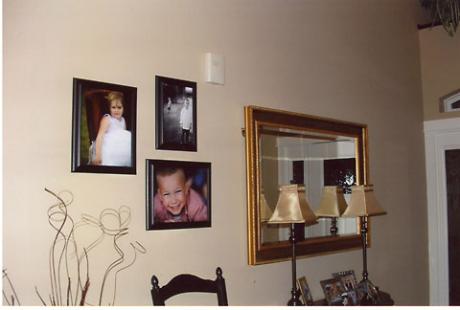Hi all. I wanted to fit this Q&A in at the end of last month but things got a tad crazy and it didn’t happen as I planned. All that matters though, is that I’m here now with it, right?
Today’s Q&A is with Lora. I had the pleasure of photographing Lora’s triplets back in, oh was it May? {Wow, where’d the summer go?} Lora’s booked her session as the 2nd Marmalade Studio session, and it helped kick off my studio with a huge bang!
Three five year olds may seem daunting for the mere mortal photographer however, for me, well it was still daunting. LOL. I had nothing to fear though, her children were so fun and happy and well behaved and, for lack of another word, lovely to photograph. We played games (they loved the American Idol thumbs up game that their dad initiated), I messed around with spelling of their names (my favorite part!) and we all had fun and most importantly we created imagery that Lora absolutely adores.
Several weeks ago Lora contacted me out of the blue to offer to mail me images that show off her home gallery of Marmalade art and I thought to myself, “BRILLIANT!”. So many of my clients talk about their displays of my work as art in their homes and Lora offered a wonderful opportunity for me. I asked permission to use the images she sent and also arranged for a Q&A (she is a Licensed Speech-Language Pathologist, owns Tiny Talkers, Inc., a Pediatric Speech Therapy provider). I am excited to present our Q&A together as well as images from their Marmalade session and finally (and most impressive of all) images from her home display of Marmalade work. Thanks to Lora for taking the time out to do this Q&A and thanks to you, the reader, for reading this in depth discussion regarding speech issues, which I hope many of my blog readers will find helpful.
Lora is the owner of Tiny Talkers, Inc, specialists in Pediatric Speech Therapy. She doesn’t have a website and if you are interested in contacting her, please email me and I’ll forward along the infromation for her as she’s a busybusy lady.
1. Being a licensed speech-language pathologist must be a rewarding career. You specialize in speech pathologies dealing with autism and speeh apraxia, how did you decide on this specialty?
Yes, being a speech-language pathologist is a very rewarding career. I truly enjoy working with children. I currently work with the birth to 3 population through our state’s Early Intervention Program. I would like all of the parents out there to know that if they suspect their child may have a delay in ANY areas of development (ie walking, talking,etc.), please call 1-800-323-GROW to schedule a FREE developmental evaluation. Also, please express your concern to your pediatrician.
The Early Intervention Program is a federally funded program and is generally free to all- there is a small family fee, based on income.
The reason I have decided to “specialize” in the treatment of children with Autism is a fairly easy question to answer. The incidence of children whodemonstrate signs of Autism is staggering. I see many, many children with Autism each year, and it keeps growing. I honestly could not work effectively as an SLP if I did not specialize in AUTISM!
For those of you out there who do not know the signs of Autism, here is a brief overview of what Autism is and what it looks like:
What is Autism?:
Autism (sometimes called “classical autismâ€) is the most common condition in a group of developmental disorders known as the autism spectrum disorders (ASDs). Autism is characterized by impaired social interaction, problems with verbal and nonverbal communication, and unusual, repetitive, or severely limited activities and interests.
Signs of Autism:
Autistic children have difficulties with social interaction, problems with verbal and nonverbal communication, and repetitive behaviors or narrow, obsessive interests. These behaviors can range in impact from mild to disabling.
The hallmark feature of autism is impaired social interaction. Parents are usually the first to notice symptoms of autism in their child. As early as infancy, a baby with autism may be unresponsive to people or focus intently on one item to the exclusion of others for long periods of time. A child with autism may appear to develop normally and then withdraw and become indifferent to social engagement.
Children with autism may fail to respond to their name and often avoid eye contact with other people. They have difficulty interpreting what others are thinking or feeling because they can’t understand social cues, such as tone of voice or facial expressions, and don’t watch other people’s faces for clues about appropriate behavior. They lack empathy.
Many children with autism engage in repetitive movements such as rocking and twirling, or in self-abusive behavior such as biting or head-banging. They also tend to start speaking later than other children and may refer to themselves by name instead of “I†or “me.†Children with autism don’t know how to play interactively with other children. Some speak in a sing-song voice about a narrow range of favorite topics, with little regard for the interests of the person to whom they are speaking.
Many children with autism have a reduced sensitivity to pain, but are abnormally sensitive to sound, touch, or other sensory stimulation. These unusual reactions may contribute to behavioral symptoms such as a resistance to being cuddled or hugged.
Red Flags:
No or reduced eye contact
No use of gestures such as pointing or waving bye bye
Hand flapping
Walking on tip toes
A child is not talking AND does NOT attempt to communicate by using gestures and body language.
Acts as if he/she is “deaf.”
Appears aloof
Does not play with toys the way intended (picks up a car and spins the wheels, while staring only at the wheels, instead of pushing it and saying “vroomvroom”)
Covers ears with “normal” sounds
Has limited interests or/and or is very rigid
Lines up puzzle pieces or other things.
Quick Facts:
Boys tend to outnumber girls with Autism at a ration of 4:1.
1 in 166 children have an ASD (Autism Spectrum Disorder)
Some good websites:
Autism.org
Autism-society.org
Autism.com
talkaboutcuringautism.org
2. Could you tell us a bit about your work as a speech-language pathologist?
In order to become a licensed Speech-language Pathologist, you must obtain a Masters Degree in Speech Pathology.
I complete evaluations, and provide one on one speech therapy with a variety of children. Some have a simple language delay, others have diagnoses of Autism, mental retardation, cerebal palsy, downs syndrome and other special needs children. I provide play based assessment and treatment using typical toys.
3. Do you have any resources (online or in real life) for anyone out there that may be suspecting that their child is dealing with speech-language issues? At what point/age or situation, would you recommend seeking help with speech problems?
Yes, if you suspect your child may be having problems with development, and he/she is under the age of 3, you can call 1-800-323-GROW- this will give you access to the State of Illinois’ Early Intervention System. If your child is over age 3, you can contact your local school district and they are required by law to provide your child with a free evaluation. Also, use
your pediatrician as a resource. But, if you feel like your pediatrician is not concerned about your child’s speech development, but YOU have concern, please follow your gut and contact the resources stated above.
I would suggest seeking a speech evaluation in the following situations:
•Your child is not talking or saying any words by age 16 months.
•Your child is not speaking or acting like same aged children.
•Your child is getting teased about his/her speech production.
•Your child is showing signs of “stuttering” after age 3. (children go through a normal period of speech disfluencies between age 2-3).
•Your child is difficult to understand after age 2 and 1/2.
•Anytime you feel that things are just not “right” with your child.
Marmalade: This Q&A hits closer to home for me, my youngest child is in speech therapy (has been for about a year) and it’s been a tremendous help in her verbal and receptive communication. There’s some information that would’ve been wonderful to have earlier in the game for us and I hope this proves helpful to my readers out there.
Lora: Lastly, the reason I chose Marmalade: I was providing therapy in the home of one of my clients. I had taken a look at the absolutely stunning photos taken of her children. I had honestly never seen anything like it. We have been to various studios- and that is all fine and good. However, I really liked the idea of being outdoors, and really liked how each of the children’s spirits seemed to be captured in the photos. I thought, I have to do this! These photos were truly works of art- not the same old boring thing that had been done time and time again by the cookie cutter operations out there. My client simply raved about the personality, professionalism and experience of Marmalade Photography and strongly encouraged me to call. She had had a wonderful experience and treasured her photos. Once I called and spoke with Marianne on the phone, I knew it was a great decision. She asked questions about our children, answered questions that I had about the process and gave excellent suggestions to help me get exactly what I was looking for. On the day of the photo shoot, it was amazing.
Marianne is gifted- she works flawlessly with children and knows just how to get the right shot. She spent lots of time with us and the kids did not feel like they were getting their pictures taken- they were just exploring the beautiful territory around Marmalade’s urban studio. I just loved the experience. And, most of all, my photos are just absolutely, positively gorgeous. They adorn my home and are pieces of art in my eyes.
Thanks Lora for those kind kind words and for these snaps of your home displays:






and some images from the session:














Thanks for stopping in! Til next time…
xoxo, Mare













Can I just say I absolutly love the shot of the little girl in the red dress wow